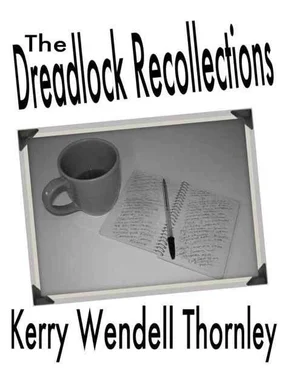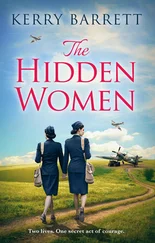"Yeah, when he went to Russia, I thought that was a big deal."
"Now if you go to Alexandria, that ain't far from Washington. They'll probably call you over for a long interview. That should be enough to make The Idle Warriors almost as well known as Lee Harvey Oswald himself! You want to publish a book and be a big-shot author and all that? Go to Alexandria. Be near Washington when that commission convenes."
As I stepped out into the afternoon sunlight I thought about what Slim had said, deciding it made perfect sense.
On December 13th of 1963, I boarded a bus for Alexandria.
Near Christmas, I secured a job as a doorman in a newly constructed high-rise between Alexandria and Arlington in Virginia. Along with the job came spacious apartment, where I spent my spare hours working on a completely new draft of The Idle Warriors .
Heretofore, everyone who read the manuscript had complained that the plot lacked unity. So I relied on the device of expanding the final chapter, dealing with my hero's defection to Russia, to embrace the whole story, incorporating earlier events by means of flashbacks.
Although the manuscript lacked both the lyricism of the first draft, written in my first months in New Orleans, and the literary richness of the version I was working on that autumn when the assassination occurred, this effort at least conformed to the "Romantic Realist" ideas of Ayn Rand, so I was happy with it.
And sure enough, just as Slim predicted, the Warren Commission contacted me. I went to their headquarters in the VFW Building in Washington, DC, and testified at great length.
In all the time that elapsed since the assassination, I spared very little thought on Slim or the enigmatic Brother-in-law. Then one night one of the residents in the building where I worked told me of serving as a test pilot of flying saucers for the Navy.
By this time, I had graduated from my position as doorman to night PBX desk clerk. This middle-aged man, whose name I don't remember, used to come down into the lobby and talk to me when things were slow.
Whether he was truthful or not was another question. I could not, however, avoid thinking of how closely this man's stories resembled Brother-in-law's theories about UFO origins.
"Yeah, I know the damned things are an advanced type of aircraft, because right after the war I was flying them. We all had to sign papers promising to make a career of the Navy before they'd let us in on the project. It was hush-hush all the way."
"Then why are you a civilian now?" I wanted to know.
"Because a bunch of us resigned our commissions all at the same time. We got pissed off at our CO."
I didn't have to ask many questions. He just liked to talk, so I listened.
"My buddy in that outfit got picked up by the Shore Patrol one day after we got out and that's the last anyone ever saw of him. He was moving at the time, with half of his furniture in one apartment and the other half in another, and they just came and took him away. Why they never came after me is anybody's guess."
"Where do you think he is?" I asked.
"I know where he is. He's in a stockade somewhere."
According to him, the United States developed toward the end of World War II a flying saucer that combined the principles of jet propulsion with those of the Sikorsky helicopter. "I test flew it a number of times," he assured me. "At that time they were still trying to work out the bugs in it. At certain speeds it tended to wobble."
Then he told me U.S. flying saucers had been used since then, in a top secret mission to repel a Russian air attack on this country.
After the storyteller departed I turned to the security guard who had been sitting nearby saying nothing all through the conversation. "What do you make of that guy?"
"Aw, I think that man just likes to hear himself talk. He's just bullshitting. If he thought you'd believe it, he'd tell you there were Eskimos in the Sahara Desert."
That was much the way I had felt about Brother-in-law. Unlike Gary, though, this man seemed harmless at all times. I kind of liked him. Somehow, that made his story sound more plausible to my ears.
Late in the summer of 1964 I wrote a letter to Slim Brooks, informing him of my plans to visit New Orleans briefly, in about two weeks.
I traveled by bus from Virginia to Gainesville, Georgia, where one of my old French Quarter friends, Grace Caplinger, now Grace MacEachron, was living with her new husband, John MacEachron, a teacher at a military academy there. We drove together in their car, with their baby daughter, Marion, to New Orleans.
Venturing forth alone in the French Quarter, I soon began to catch up on the latest news. Somebody told me that a number of my friends had been arrested as Communists by the New Orleans police in a raid on a new coffee house on Esplanade, the Quorum. Seventy-three people, as I recall, were busted in the fiasco. Everyone was up in arms about it, circulating petitions.
Someone with whom I was distantly acquainted offered to show me where the Quorum was, saying it had replaced the Ryder as the gathering place for all the hard-core Beatniks. We took out from the Bourbon House in the direction of Esplanade, walking up Royal Street.
As we neared the Saint Louis Cathedral, he said casually, "Did you happen to know Ola Holcomb, who lived in that apartment across the street?"
"I didn't know she lived there but, yeah, I've known Ola for years."
"She blew her brains out all over the kitchen floor in there with a.38 pistol a week or so ago."
"Jesus! She and I were very close at one time."
"I'm sorry. I didn't realize that. I guess I could have broke the news some other way."
"Why would Ola, of all people, commit suicide?"
"They say she was all bent out of shape about some guy she was in love with who rejected her. Her mother came home and found the body."
"Yeah, last I heard she was living with her mother. She seemed very fond of that old gal. And Ola was such a strong woman. It doesn't figure."
"They say she was really stuck on the guy."
"You know something?" I said as we continued our way up the street. "All afternoon I've been looking at the pretty old buildings and all the hip people and wondering why the hell I ever left the French Quarter. Now I remember. What a depressing place! People are always doing themselves in here."
When we arrived at the Quorum my companion introduced me to the owner, a man named Marcus, who was a friend of Jack Frazier, proprietor of the Ryder. Glancing at the Goldwater button on my shirt, Marcus said, "Come on now, you're not serious?"
"Not only am I seriously supporting Goldwater," I replied, "but if you'll let me, I'll deliver a speech here some evening explaining why."
"No," he said, laughing, "I don't think so."
"Yeah, that's the way you liberals are," I retorted. "Always talking about freedom and the right to dissent, except when the speaker is of the right instead of the left."
After thinking a minute, he said, "Now, I wouldn't want anyone to accuse us of being narrow-minded. We usually have a discussion group here," naming such-and-such night, Friday or Saturday, probably. "What do you want to call your rap?" "'The Intellectually Respectable Right,'" I said. "I want to point out to them that all Goldwater's supporters are not anti-intellectual."
"All right. You're on."
John Kamus was present at the Quorum, so I then wandered over to his side of the room and asked how things were going.
"I'm soliciting donations for an Ola Holcomb Memorial Collection at the New Orleans Public Library," he said, after we had exchanged our condolences about the tragedy of her death. "Ola so loved books, we thought that would be an especially fitting way to honor her."
Читать дальше












